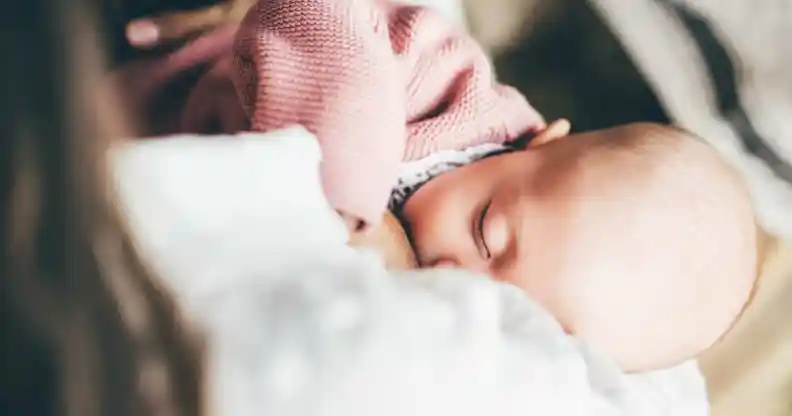EU court urged to protect rainbow families in case of baby refused citizenship because she has two mothers

Stock photo of a young baby. (Envato)
Two mothers’ fight for their baby’s right to EU citizenship will be heard by the European Court of Justice.
In 2019, Bulgarian-born Kalina Ivanova and Gilbratar-born Jane Jones welcomed a child, Sara, who was born in Spain (not their real names).
Under Spanish law, the baby cannot be considered for citizenship as neither of her mothers are Spanish citizens.
Jones tried to apply for Sara to be a UK citizen, as she is of British descent. However this was denied, due to Jones having been born in Gibraltar and not in the UK, meaning she cannot pass on her citizenship to her child.
As a last-ditch attempt, Ivanova requested Bulgarian citizenship for her child. This was rejected by the government, which argued that a child cannot have two mothers and refused to issue a birth certificate stating as such.
As a result Sara has been deprived of citizenship and has no documentation of any kind. This poses a significant risk to her health, education and social security, and prevents the family from leaving Spain.
Authorities in #Bulgaria?? are not recognising the valid #EU?? birth cert of the child of a same sex couple. On Feb 9 the CJEU must clarify that if you are a parent in one EU country, you are a parent in every EU country. #ParentsWithoutBorders?️? pic.twitter.com/7xvC4wZw4t
— ILGA-Europe (@ILGAEurope) February 2, 2021
The case will be brought before the European Court of Justice (CJEU) on 9 February. According to the mothers’ legal representatives, Bulgarian authorities are violating the rights of a European citizen on the grounds of sexual orientation, namely the rights to free movement and to family life.
The citizenship battle is a breach of the fundamental principals of the EU, the court will hear.
Arpi Avestisyan is head of litigations at ILGA-Europe, which is supporting Bulgarian LGBT+ rights group Deytsvie with the citizenship case.
Avestisyan has called on the court to make things easier for all LGBT+ families to gain citizenship.
“Through this case, the CJEU has the opportunity to clarify that parentage established in one member state must be recognised across the EU, and all EU citizens and their families equally enjoy freedom of movement.”
Avestisyan also referred to the words of EU president Ursula Von der Leyen.
“In her state of the union 2020 address, president Ursula von der Leyen said: ‘If you are parent in one country, you are parent in every country’.
“However, thousands of same-sex-parented families in the EU currently live at risk of not having the parental relations recognised and face legal turmoil due to differences in member states’ national systems.
“Parents cease to exist when moving from one EU member state to another, where birth certificates from another member state are not recognised. These situations create severe obstacles for children in exercising the rights to which they are entitled under European and international law.”
Denitsa Lyubenova, attorney and co-founder of Deytsvie, added: “Countries in central and eastern Europe are derogating from basic human rights guaranteed by the European Convention on Human Rights and the Charter of the Fundamental Rights of the EU.
“This weakens the EU position as a guardian of human rights. With this case we have the chance to realign the practice in EU countries with the principles set out in the EU Treaties and to protect the rights of LGBTI families and their children moving across Europe.
“The court needs to reconfirm that rainbow families are as valid as all others.”

